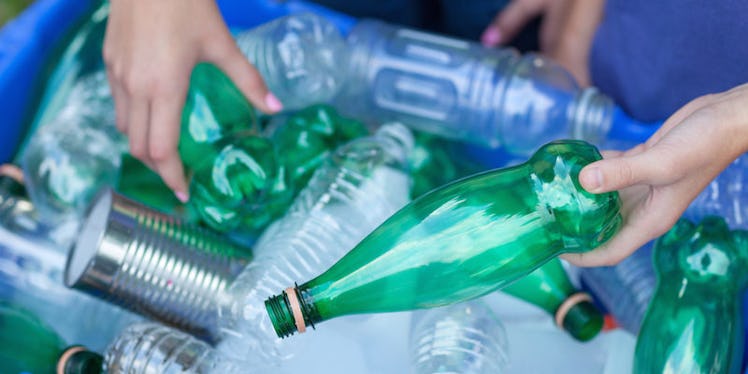
3 Ways To Cut Down Your Use Of Plastic Without Making Huge Lifestyle Changes
Not too long ago, I did not think about much. I mean, I thought about my family, my friends, my future, my career, my love interest(s) and my way of doing things, but there wasn't much outside that "me" spectrum I paid attention to.
This meant I used to do my shopping with just my wallet on me. I'd get a new plastic bag every single time I walked into the grocery store. I remember a time where they were free, lying there, rolled up at the end of the counter for everyone to take, use and then throw out.
But even when I started paying 25 cents per bag, I still did not care. Honestly, how else was I going to get all my groceries home?
Plastic makes life easier. Let's not pretend it doesn't. It's basically shatter resistant, doesn't corrode quickly and therefore lasts long and keeps your food fresh and clean. It's lightweight, and to make and purchase it is relatively inexpensive. But here's the catch: It is ruining everything we love.
We all love the beach, the forest, a nice green field, cute animals and even people. So, let's not pretend we don't care what happens to all of them, or that letting someone else take care of the problem will do the trick.
I'm not saying I've become an environmental expert over the past few years, but I now know my way around plastic. And so should you.
It's no longer something we can ignore. Saving our planet requires action, and there is simple action we can take each day that will add up to huge benefits in the future.
Here's what you need to know about this harmful substance: The word plastic comes from the Greek word "plastikos," which literally means "able to be molded." That sounds about right.
Plastic is everywhere. It's in your TV, your car, your fridge, around your food, in your shoes, your accessories, the gum you chew and children's' toys. The list is endless.
There are a few problems with this. First of all, plastic is usually made out of extractions from petroleum, natural gas or coal. Those are all non-renewable resources.
The second problem is not only is plastic made from sources we'd like to sustain for much, much longer, but it also takes a very energy intensive technique to produce it.
And last, but not least, plastic is not a biodegradable product. It will not disappear slowly if you “accidentally” drop your candy wrapper in the street.
It's clear we are living in a plastic-dominated era. It's destructing our ecosystem (land, air and water), and we're all feeling — and will continue to feel — the consequences.
Ever heard of the "The Great Pacific Garbage Patch?" It's a huge surface in the middle of the North Pacific Ocean, consisting of marine debris gathered by oceanic currents. The patch includes miserable amounts of plastic, which is hurting all marine wildlife. The plastic particles end up in the stomachs of turtles, albatross and birds — just to name a few — and they die.
To give you an idea of what I'm talking about, 20 tons of manmade debris washes up on Midway Island each year. Twenty tons. And that's just one place in one year.
I am not saying it should be banned (although that would be lovely), but realistically, I am arguing it should be used more wisely and that, where possible, replaced by something sustainable. Here are the three things we can all change without making drastic life changes:
1. Plastic Grocery Bags
The idea is so simple. Get yourself a nice, non-plastic bag, call it your grocery bag and make it so. Stop using new plastic bags every time you have a little shopping spree.
When you buy something new, take the article and put it in your own bag. My mom (the wise woman she is) always has a thin, cotton bag folded into her purse. It doesn't take up any space, it weighs little to nothing and she hasn't used a plastic bag in ages as a result.
2. Plastic Water Bottles
You can get high quality, stainless steel or recycled plastic bottles to use over and over again. It replaces the millions of one-serve plastic bottles we purchase and throw out every day.
It's so simple. Grab your bottle, go to wherever you need to go and fill it up in the restroom or ask the bar for some tap water. If the water near you isn't drinkable, there are water bottles with built-in filters, too.
There is literally no need to buy a plastic bottle of water anymore. If you feel like buying water in the supermarket anyway, grab yourself a glass bottle.
3. Recycle
This one takes a little bit more effort, but after what I've just told you, it's an effort you should want to make. Did you know that in America, on average, 2.5 million plastic bottles are used per hour? And out of those 2.5 million plastic bottles, only about 23 percent gets recycled. That's a lot of plastic and not a lot of recycling.
So, here's an idea: Keep your normal bin, and then place a little basket next to it. When that's full, bring it to a recycling bin near you.
Look at you recycling, saving the world from plastic rubbish and saving little animals. Well done.